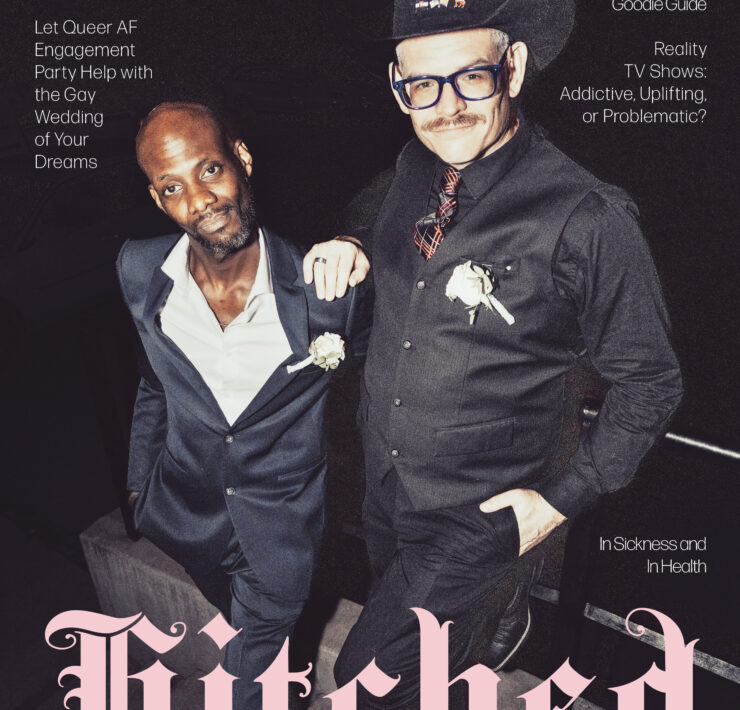In Sickness & In Health

I clearly remember the moment I found out same-gender marriage had been federally legalized in the United States. I was 14 years old and sitting in my best friend’s living room as we watched the news. At the time, I was so excited, but I didn’t realize the promise of marriage equality didn’t apply to me.
Supplemental Security Income (SSI) is a federal program that provides financial assistance to low income people who are over the age of 65 or disabled. Since the creation of SSI through the social security amendments of 1972, there have been rules in place that limit a person’s SSI eligibility based on, not only their own income and assets, but their spouses as well.
In November 2023, almost 7.5 million people in the U.S. received SSI. Millions of Disabled Americans have been forced to choose between what is often their only income and getting married to the person they love. In addition, if both people in a married couple are on SSI, they will receive three fourths of what they would as a non married individual. The couples asset limit for SSI is $3000, and the monthly income limit is less than that. For most people, there are legal benefits to marriage, but disabled people on SSI are penalized for it.
Twenty-six-year-old SSI recipient Clover Penelope has dreamt about getting married since they were a child. They have pinterest boards dedicated to rings, wedding dresses, decor, color pallets and more. However, this dream has been, in her words, “snuffed out” when they became disabled and could no longer work. She spent three long years fighting for benefits while barely scraping by and now only receives $628 dollars a month in income.
”It’s devastating, isolating, and, in a way, humiliating,” says Penelope. “All of it is so dehumanizing; I don’t feel like a person.” She dreams of not only a wedding but a marriage and a family. “I want to teach someone to be human; being a mother has been a long term goal of mine,” they say. Penelope is one of so many disabled individuals who has had their dreams for marriage and a family hindered by restrictive marriage penalties and income limits.”
Not only are there income limits in place for SSI recipients but also for recipients for the government health insurance Medicaid. This health insurance covers many disabled people both on and off SSI and is, for many, the only way to afford life-saving treatments and medications. Though millions of disabled Americans receive Medicaid coverage, the majority of people on Medicaid are not disabled. Placing an income and asset limit on Medicaid recipients not only results in further limitations on disabled people’s ability to get married, it also speaks to a larger issue at hand in our welfare and medical systems. No one, disabled or not, should be forced to live in state-sanctioned poverty to get the medical care they need.
My arthritis medication, Enbrel, alone costs around $12,000 a month for four injections out of pocket. Without my medicaid, I honestly don’t know how long I would live, and I know for a fact my quality of life would be substantially worse. I take five medications on a daily basis as well as several as-needed meds to treat medical symptoms. Medicaid is the only reason I am able to afford any of these meds.I had my own dreams of getting married one day, but I let go of those a long time ago.I remember six years ago, when I was 19, my ex and I would talk about our dream wedding knowing even then it would never be a reality. ”Fuck the government; let’s get married,” was a common phrase you would hear me say to them as we talked about venues and what we would wear. It was all for fun, but even then, there was a sadness looming over those conversations knowing it would never be real.
We have established the fact that many disabled people cannot get legally married without losing their benefits; however, these rules go beyond just legal marriage. Social Security may deem a person as “holding out from marriage” if they believe that two people living together are a couple who share assets and/or presents as married. They may launch an investigation into a couple living together, and if they are determined to be holding out, the disabled individual may lose their benefits.This investigation often looks onto things like if a couple refers to each other as spouses, if you receive mail with your partner’s last name, if you take on your partner’s last name on social media, if both your names are on the lease where you rent and more.
The holding out rule is particularly cruel in my opinion, as not only does this prevent legal marriage, it makes any kind of long lasting romantic relationship a risk. Disabled people deserve to have long-lasting and meaningful relationships without living in fear of losing their livelihood.










